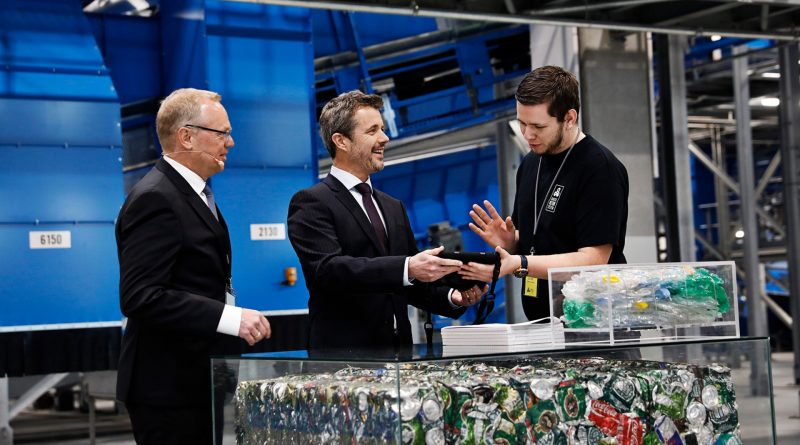Automated plant for Dansk Retursystem
Stadler has completed commissioning of a new beverage packaging sorting plant it designed and built for Dansk Retursystem in Taastrup, Denmark. The inauguration ceremony of the plant, held on 10 March, was hosted by Dansk Retursystem Chief Executive Officer Lars Krejberg Petersen and attended by guests of honor Frederick, Crown Prince of Denmark and Lea Wermelin, Minister of the Environment.
The plant processes PET bottles and aluminium cans collected throughout the country via the return system, producing bales of PET bottles and aluminium cans for recycling. With a capacity of 110m3/h, it is expected to process around 55% of the country’s recycled cans and PET bottles for a total of more than 25,000t of material a year, working 16h/d on two shifts, for 300d/a.
Dansk Retursystem is a non-profit company owned by Danish breweries and regulated by statutory order under the Danish Environmental Protection Act. Founded in 2000, it operates the country’s deposit and return system for beverage bottles and cans with the aim of recycling as many as possible into new ones. All profits are reinvested into the company to improve the system and ensure that the high return rate is maintained or raised even further. The Danish Environmental Protection Agency monitors Dansk Retursystem’s activities and periodically reviews its operation to renew its exclusive right to operate the country’s deposit and return system for a new term.
Dansk Retursystem is a good example of a successful collaboration between the private and public sectors. Its business model creates a circular economy that involves the entire chain: beverage packaging manufacturers, breweries, retailers, consumers, transport companies, and sorting recycling companies. Dansk Retursystem collects bottles and cans from reverse vending machines found at 3000 stores across the country, from retailers, shops, offices, cafés and restaurants, or through the “pantstation” deposit return banks located in 12 cities. It sorts all the collected packaging into glass and plastic bottles and aluminium cans, which are recycled into new packaging. The result of this effective system is that 9 out of 10 bottles marked for deposit are returned and recycled, with very little waste in the process.
The plant uses magnetic separation to sort the aluminium cans, ejecting any ferrous materials, and Near Infrared (NIR) technology for the PET bottles. Also part of the process is the removal of loose labels. At the end of the line, balers compact the aluminium cans on one output line and PET bottles on the other. The project presented particular challenges due to the high level of automatisation and flexibility of the plant, which required Stadler’s ingenuity to develop a tailored solution. Armin Winand, joint project manager explains: “This is a fully automated sorting plant with a high throughput. We addressed this with extra-large intermediate bunkers with a capacity up to 240m³ at various stages of the process and a similarly oversized bunker conveyor 20m long, 4m wide and 4m high. This is the biggest Stadlerhas ever designed and built. At the end of the process, the aluminium and PET bales are transported automatically into the storage area.”
Photo: Inauguration DRS

